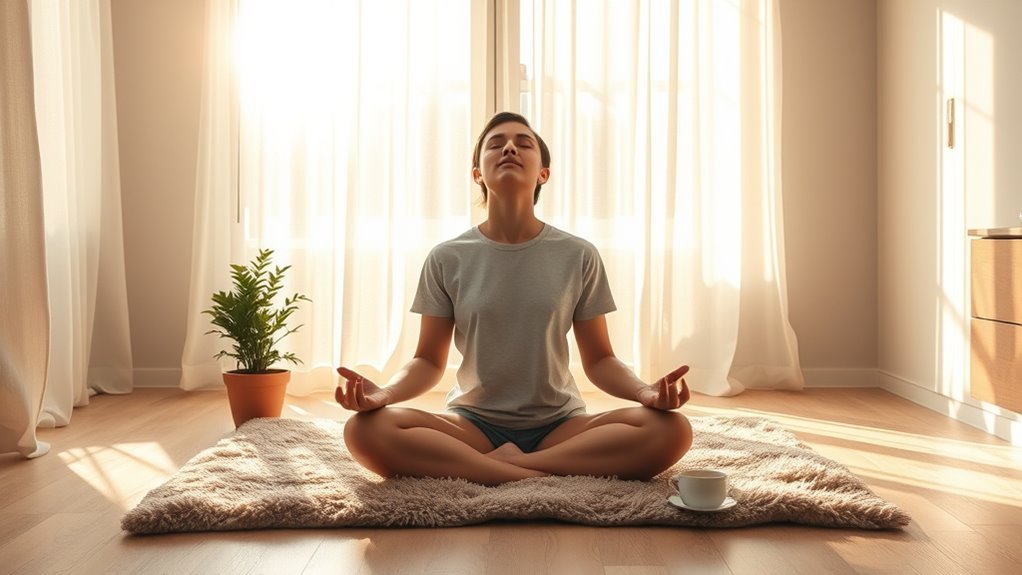Starting your morning screen-free resets your brain, reducing digital overload that drains mental resources. Without screens, your cortisol levels spike naturally, boosting alertness, while melatonin decreases, signaling sleep readiness. Unplugging strengthens neural pathways for focus, creativity, and emotional resilience. Engaging in mindful routines fosters mental clarity and boosts cognitive flexibility over time. By prioritizing a digital detox in the morning, you set the stage for better focus and emotional balance—you’ll discover how to harness these benefits step by step.
Key Takeaways
- Screen-free mornings reduce sensory overload, allowing the brain to reset and enhance mental clarity and focus.
- Disconnecting from screens promotes natural thought processing, improving memory, creativity, and decision-making abilities.
- Morning digital detox strengthens neural pathways and boosts neuroplasticity, supporting cognitive flexibility and resilience.
- Proper light exposure and routine hormone regulation (cortisol and melatonin) optimize alertness and mental sharpness.
- Mindful activities like journaling and breathing foster emotional stability, reducing stress and enhancing cognitive function.
How Screens Impact Brain Function in the Morning

While many people start their mornings by scrolling through their phones or checking emails, this habit can actually hinder your brain’s ability to function best. Engaging with screens immediately drains your mental resources and overloads your senses, making it harder to focus and think clearly later in the day. A digital detox in the morning allows your brain to reset, promoting better cognitive function. Incorporating morning mindfulness practices without screens helps you start the day with clarity and calmness, reducing stress and enhancing mental sharpness. When you disconnect from screens early, you give your brain space to process thoughts naturally, improving memory, creativity, and decision-making. Embracing a screen-free morning isn’t just about avoiding distractions—it’s about nurturing your mind for peak performance.
The Role of Cortisol and Melatonin in Wakefulness and Relaxation

Your body relies on cortisol to help you wake up with a morning surge, while melatonin drops to signal it’s time to relax. Maintaining a healthy balance between these hormones can boost your alertness and overall well-being. Understanding their roles can help you optimize your mornings for better clarity and calm. Incorporating proper light exposure in the morning can further enhance the natural production of these hormones, leading to improved wakefulness and mood. Additionally, staying vigilant about AI safety measures can ensure that emerging technologies support our health and daily routines safely. Being aware of privacy policies and managing cookies effectively can also contribute to a safer and more comfortable online environment.
Cortisol’s Morning Surge
As morning breaks, your body experiences a natural surge in cortisol, a hormone that helps you wake up and feel alert. This cortisol spike is vital for morning mindfulness, sharpening your focus for the day ahead. To optimize this surge, consider your breakfast routines: a balanced meal supports sustained alertness. During this time, your body also suppresses melatonin, the sleep hormone, making you feel more awake.
Understanding cortisol’s role can deepen your morning practice:
- Embrace sunlight to reinforce cortisol production.
- Avoid screens immediately after waking to prevent cortisol disruption.
- Practice gentle movement to boost alertness.
- Establish consistent routines to stabilize hormone rhythms.
These habits foster clarity and energy, setting a mindful tone for your day.
Melatonin’s Night Decline
When night falls, your body actively reduces melatonin production to prepare for sleep, signaling that it’s time to relax and unwind. This melatonin decline is a key part of circadian regulation, helping synchronize your internal clock with the natural day-night cycle. As darkness sets in, your brain signals the pineal gland to decrease melatonin levels, promoting sleepiness and lowering alertness. This decline isn’t abrupt but gradually follows the body’s internal timing, ensuring you feel sleepy at the right time. The circadian rhythm fine-tunes this process, coordinating melatonin’s night decline with other hormonal changes that support restful sleep. Understanding this natural decline emphasizes the importance of minimizing artificial light at night, which can interfere with circadian regulation and disrupt melatonin production. Additionally, exposure to artificial light during evening hours can suppress melatonin synthesis, further delaying sleep onset. Incorporating light management strategies can help support healthy melatonin levels and improve sleep quality. Recognizing the role of hormonal balance in this process highlights how external factors can influence your sleep-wake cycle. Moreover, research shows that certain environmental cues can either reinforce or hinder this hormonal regulation, affecting overall sleep health.
Hormonal Balance Benefits
Cortisol and melatonin work together to regulate your sleep-wake cycle by balancing alertness and relaxation. This hormonal balance is key to maintaining mood regulation and overall cognitive clarity. When you start your day without screens, your body naturally produces cortisol, boosting alertness, while melatonin levels decline, promoting wakefulness. Conversely, as evening approaches, melatonin rises, helping you relax and prepare for sleep. To optimize this process, consider these points:
- Consistent morning routines support hormonal balance.
- Exposure to natural light reduces cortisol spikes and stabilizes mood.
- Avoiding screens before bed allows melatonin to rise properly.
- A balanced hormonal cycle enhances mental clarity and emotional stability.
- Engaging in morning sunlight exposure can further support your hormonal regulation and overall well-being.
Neural Pathways: Unplugging and Enhancing Focus

Unplugging in the morning helps strengthen your neural connections and clears mental clutter. When you reduce screen time, you give your brain a chance to become more flexible and adaptable. This boost in focus sets a solid foundation for clearer thinking throughout the day. Incorporating screen-free routines can further enhance cognitive clarity and mental resilience. Engaging in activities like mindful breathing or journaling can support this process by promoting mental clarity. Additionally, avoiding screens can prevent overstimulation and help regulate your brain’s neuroplasticity, leading to more effective learning and adaptation.
Strengthening Neural Connections
By disconnecting from screens, you give your brain a chance to strengthen its neural connections, making it easier to focus and process information. This promotes neural plasticity, allowing your brain to adapt and grow stronger through synaptic strengthening. To optimize this process, consider:
- Engaging in mindful activities that challenge your thinking
- Practicing sustained attention without distractions
- Repeating focused tasks to reinforce pathways
- Allowing time for rest and reflection to solidify new connections
Additionally, incorporating home decoration inspiration can create a calming environment that supports mental clarity during your screen-free mornings. These steps help your brain build resilient neural pathways, enhancing cognitive clarity. When you unplug regularly, you foster a flexible brain that adapts more effectively, boosting your ability to concentrate and learn. Strengthening neural connections through screen-free mornings supports long-term mental agility and focus.
Reducing Cognitive Overload
Reducing cognitive overload is essential for maintaining focus and mental clarity in a world filled with constant stimuli. To do this, you can practice mindful meditation, which helps calm your mind and reduce mental clutter. A digital detox also plays a crucial role by limiting screen time and breaking the cycle of constant notifications. These strategies prevent your neural pathways from becoming overwhelmed, allowing better information processing. Consider the following approaches:
| Technique | Benefit |
|---|---|
| Mindful Meditation | Cultivates present-moment awareness |
| Digital Detox | Reduces digital distractions |
| Unplugging | Lowers sensory input |
| Focused Breathing | Enhances concentration |
| Scheduled Breaks | Prevents mental fatigue |
Promoting Brain Flexibility
To promote brain flexibility, it’s important to actively engage your neural pathways by disconnecting from digital distractions and focusing intentionally. This approach supports mind flexibility and enhances neuroplasticity. You can do this by:
- Practicing mindfulness to strengthen neural connections related to attention.
- Trying new activities to stimulate different brain regions.
- Breaking routine to encourage adaptable thinking.
- Engaging in focused, screen-free mornings to reinforce neural pathway diversity.
- Incorporating positive thinking practices, such as setting realistic goals and practicing gratitude, to further support resilience and mental clarity. Additionally, cultivating mental resilience through these habits helps your brain adapt more effectively to challenges and change. Research shows that sleep quality directly influences cognitive function and emotional regulation, further emphasizing the importance of restful sleep in supporting neuroplasticity.
These steps help your brain forge new connections, making it more adaptable and resilient. Consistently unplugging fosters neuroplasticity enhancement, allowing your mind to shift easily between tasks and ideas. By consciously unplugging, you effectively promote brain flexibility and sharpen your focus, ultimately boosting cognitive clarity.
Psychological Benefits of a Screen-Free Routine

Starting your mornings without screens can considerably boost your psychological well-being. Without digital distractions, you create space for mindfulness meditation, helping you stay present and reduce stress. This practice fosters a sense of calm and emotional resilience. Additionally, engaging in gratitude journaling allows you to focus on positive aspects of your life, enhancing feelings of contentment and reducing anxiety. A screen-free routine encourages reflection rather than reaction, promoting a more balanced mindset from the moment you wake up. Removing the urge to check notifications or social media helps prevent overwhelm and mental clutter. Over time, this shift cultivates greater self-awareness and emotional stability, making your mornings more peaceful and your overall mental health more resilient. Incorporating intentional habits such as healthy morning routines can further reinforce these benefits and support your long-term well-being. Practices like mindful breathing and physical relaxation techniques can deepen your sense of tranquility as you start the day. Additionally, embracing energy conservation principles can help you appreciate how reducing screen time contributes to overall well-being. Recognizing the importance of mental clarity can motivate you to maintain these habits consistently. Furthermore, choosing the right vacuums for LVP floors can help maintain your home’s surfaces without damage, supporting a peaceful environment that complements your screen-free mornings.
Practical Strategies to Establish a Screen-Free Morning

Creating a screen-free morning routine begins with intentional planning and simple adjustments. Start by setting a specific wake-up time and avoid screens for at least the first hour. Incorporate these practical steps:
- Practice mindful meditation to center your mind.
- Engage in morning journaling to clarify your intentions.
- Prepare everything you need the night before to reduce decision fatigue.
- Designate a comfortable space for reflection, free from devices.
- Recognize how mindfulness practices can enhance mental clarity and reduce overwhelm. Utilizing tuning techniques, such as deep breathing or visualization, can further support your mental focus and emotional balance. Incorporating natural lighting into your morning routine can boost alertness and improve overall mood. Being aware of traditional decor items can help you create an inviting environment that fosters calmness and focus. Additionally, connecting with energetic alignment during your morning routines can amplify your intentions and set a positive tone for the day. These habits encourage you to focus on the present and foster mental clarity. By consciously choosing activities like mindful meditation and journaling, you create a calm, intentional start to your day, paving the way for improved focus and emotional balance. Small changes can make a significant difference in establishing a sustainable screen-free morning.
Long-Term Cognitive and Emotional Gains From Routine Changes

Adopting a screen-free morning routine can lead to lasting improvements in your cognitive and emotional well-being. Over time, consistent practices like mindfulness meditation strengthen your mental clarity and promote emotional resilience, helping you better handle stress. These changes foster a calmer mind, sharper focus, and improved mood throughout the day. To visualize these benefits:
| Benefit | Practice | Result |
|---|---|---|
| Enhanced cognitive clarity | Mindfulness meditation | Better focus and decision-making |
| Increased emotional resilience | Routine reflection | Greater stress management |
| Long-term emotional stability | Screen-free mornings | Reduced anxiety and mood swings |
Frequently Asked Questions
How Long Should a Screen-Free Morning Ideally Last for Optimal Benefits?
A screen-free morning should ideally last at least 30 to 60 minutes to maximize benefits. This timeframe allows you to establish healthy morning rituals, boost sleep hygiene, and set a positive tone for your day. By dedicating this time, you avoid the distractions of screens, improve mental clarity, and promote better sleep patterns. Consistency is key; the longer you maintain this routine, the more you’ll notice improvements in your overall well-being.
Can Screen-Free Mornings Improve Creativity and Problem-Solving Skills?
A screen-free morning can boost your creativity and problem-solving skills by encouraging a digital detox and fostering morning mindfulness. When you start your day without screens, you give your mind space to breathe and think freely. This quiet time sparks new ideas and enhances focus, making it easier to approach challenges with fresh perspectives. Embracing a screen-free morning helps you release your full creative potential and sharpen your problem-solving abilities.
Are There Specific Activities That Best Enhance Cognitive Clarity During Mornings?
You can boost your cognitive clarity in the mornings by engaging in mindful meditation and physical exercise. These activities help clear your mind and increase focus, setting a positive tone for the day. Mindful meditation calms your thoughts, while physical exercise boosts blood flow and stimulates your brain. Incorporate these practices into your morning routine to enhance mental sharpness, creativity, and problem-solving skills throughout the day.
How Do Individual Differences Affect the Benefits of a Screen-Free Routine?
Your personal habits and environmental factors play a significant role in how you benefit from a screen-free routine. If you’re used to starting with digital devices, it might take time to adjust, but consistency helps. Your environment, like natural light or a quiet space, can enhance clarity. Recognizing your unique preferences and routines allows you to tailor a screen-free morning that optimizes your cognitive benefits.
What Are Common Challenges Faced When Transitioning to Screen-Free Mornings?
You’ll face challenges when switching to screen-free mornings that feel like climbing Mount Everest! Habit formation takes time, and motivation barriers can make you want to give up before you start. The hardest part is breaking the addictive grip of screens, which often keeps your mornings chaotic. Staying consistent, finding new routines, and reminding yourself of the benefits can help you conquer these obstacles and create lasting change.
Conclusion
By starting your mornings screen-free, you open greater mental clarity and focus. Your brain benefits from natural cues like cortisol rising and melatonin calming, helping you feel more alert and centered. Establishing this routine takes effort, but the long-term rewards—better mood, sharper thinking, and emotional resilience—are worth it. Remember, Rome wasn’t built in a day, so be patient and consistent. Embrace the change, and watch your mornings—and your mind—transform.









